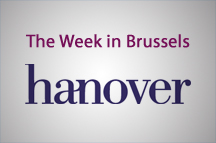The first week the elected Members of the European Parliament (MEP) were in town was dominated by the continued wrangling over the Commission President candidate and the political groups’ efforts to (re)build their power bases.
Institutional power struggle
Member State governments and the European Parliament (EP) continued their clash over the appointment of the new Commission President. While the clear majority of political groups within the EP support Jean-Claude Juncker as the legitimate candidate based on the election results, the Member States have broadened their list of potential candidates to include Finnish Prime Minister Jyrki Katainen and Christine Lagarde, Managing Director of the International Monetary Fund.

Whether they are real contenders or just bargaining chips for negotiations with the EP remains to be seen. Especially Lagarde, while acceptable to Juncker’s most vocal opponent David Cameron, would probably not go down well with countries that suffered and still suffer unpopular austerity measures, or with François Hollande who will be reluctant to see a representative of the French opposition head the Commission.
Whatever the outcome of this power struggle will be, it will determine the dynamics of future EU decision-making. Should the EP manage to push through its candidate, it will significantly strengthen its position in relation to the Council and the European Commission. Should the Member States impose a candidate, the EP will be likely to seek a more confrontational course vis-à-vis the Council on many important legislative files in the future.
Competition for allies
Within the new Parliament the Eurocritical and Eurosceptic forces to the right have, as predicted, entered into the fierce competition with each other in their efforts to form or maintain political groups. It currently looks as if the group of the European Conservatives and Reformists (ECR) led by the British Conservatives is coming out on top after having snatched the Danish People’s Party and the True Finns away from Nigel Farage’s Europe of Freedom and Democracy (EFD) group. Having accepted applications from individual MEPs from four other national parties, the ECR group now consists of 55 MEPs from 12 countries and seems to have secured its survival. Something which seemed less than certain a week ago when rumours amplified that the 19 MEPs from the Polish PiS were considering leaving the ECR.
Marine Le Pen has managed to convince the Italian Lega Nord to also leave Farage’s group and join her group of far right parties, leaving her currently with 38 MEPs from five countries, just two countries short of the required threshold of seven to be recognised as a political group and be eligible for EP funding. Whether the far right parties will manage to make the numbers remains doubtful, at least as long as they continue to rule out any alliance with Greece’s Golden Dawn and Hungary’s Jobbik.
This leaves the EFD fighting for its survival. Farage’s UKIP, one of the big winners of the elections, might well lose the fight for significance, as it is currently the only party that has committed to stay in/join the group.
While the Eurosceptics struggle to organise themselves, the Liberal (ALDE) group landed a small victory in its effort to defend its position as “kingmaker” by having the Czech ANO party join, even though with 59 MEPs (7,8%) it is still far from the 10,85% of seats it held in the previous Parliament.

The ALDE’s position as third largest group however could be threatened should the ECR accept the application of the German Eurocritical party AfD. The decision has been postponed, supposedly to provide David Cameron with some ammunition in negotiating an “acceptable” Commission Presidential candidate with Angela Merkel, who – more or less reluctantly - supports Juncker.
In the end all will be part of one big package as the new balance of power within the European Parliament, between the EU institutions and also among the Member States slowly emerges.
Christian Hierholzer
Managing Director, 
Hanover Brussels














